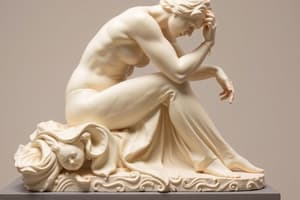Podcast
Questions and Answers
What are the artistic proofs?
What are the artistic proofs?
- Emotion, credibility, argument
- Beauty, effectiveness, relevance
- Ethos, pathos, logos (correct)
- Truth, ethics, artistry
What does ethos represent?
What does ethos represent?
Character and credibility
Give an example of ethos.
Give an example of ethos.
Obama's speech addressing his immigrant parents and non-American name.
What does pathos pertain to?
What does pathos pertain to?
What does logos refer to?
What does logos refer to?
Provide an example of logos.
Provide an example of logos.
List one of the evaluative analysis concepts.
List one of the evaluative analysis concepts.
What are immediate responses in effects contextual analysis?
What are immediate responses in effects contextual analysis?
What is truth in rhetorical analysis?
What is truth in rhetorical analysis?
Define ethics in the context of rhetoric.
Define ethics in the context of rhetoric.
What is artistry in the context of rhetoric?
What is artistry in the context of rhetoric?
Provide an example of artistry.
Provide an example of artistry.
What does textual/descriptive analysis focus on?
What does textual/descriptive analysis focus on?
What is evaluative analysis?
What is evaluative analysis?
Flashcards are hidden until you start studying
Study Notes
Artistic Proofs
- Comprises three persuasive elements: ethos, pathos, logos.
Ethos
- Relates to character and credibility; speakers are persuasive when perceived as trustworthy.
- Reputation significantly influences political decisions.
Ethos Example
- Barack Obama's inaugural speech referenced his immigrant background and unique name, establishing credibility from the outset.
Pathos
- Concerns the emotional impact on the audience; speakers aim to evoke specific feelings to enhance engagement.
Logos
- Focuses on rational argumentation; effective persuasion relies on providing logical reasons to support claims.
Logos Example
- Obama’s speech in Alaska linked climate change to terrorism, using a provocative analogy for persuasive effect.
Evaluative Analysis Concepts
- Involves assessing speeches based on effects, truth, artistry, and ethics.
Effects
- Measures the success and effectiveness of a speech, determining its immediate and lasting impacts.
Effects Contextual
- Evaluates immediate audience reactions, subsequent actions (e.g., citations), and historical significance of speeches.
Effects Textual
- Identifies typical and potential markers of a speech's success.
Truth
- Questions the accuracy of the discourse; examines trustworthiness and factuality.
Truth Contextual
- Relates to common sense, scientific knowledge of the period, and contemporary scientific understanding.
Truth Textual
- Focuses on evidence and rationality; arguments may not be factually accurate but can be deemed true based on logic.
Truth Textual Example
- The declaration "all men are created equal" is factual but is viewed as a fundamental principle in American belief.
Ethics
- Addresses the morality of behavior within discourse.
Ethics Contextual
- Assesses morality relevant to the time period, current ethical standards, and philosophical perspectives.
Ethics Textual
- Involves moral principles and the practice of these ethics in speeches.
Ethics Example
- Obama emphasized the principle of treating others with respect, illustrating ethical behavior.
Artistry
- Concerns the beauty of discourse, regardless of its truthfulness, effectiveness, or ethical implications.
Artistry Contextual
- Focuses on contemporary beauty standards and aesthetic theories relevant to the time and style.
Artistry Textual
- Involves elements like poetry, logical structures that enhance flow, and sublime expressions that transform understanding.
Artistry Example
- Martin Luther King Jr. utilized metaphors and repetition effectively in his speeches.
Rhetorical Criticisms
- Includes three analytical types: textual/descriptive, contextual/historical, and evaluative analysis.
Textual/Descriptive Analysis
- Centers on the text itself, examining its meaning and the relationships between its components.
Contextual/Historical Analysis
- Aims to discern the author's intentions and the historical context surrounding the text.
Evaluative Analysis
- Discusses relevance and the influence of the text; includes consideration of effects, truth, artistry, and ethics.
Studying That Suits You
Use AI to generate personalized quizzes and flashcards to suit your learning preferences.




